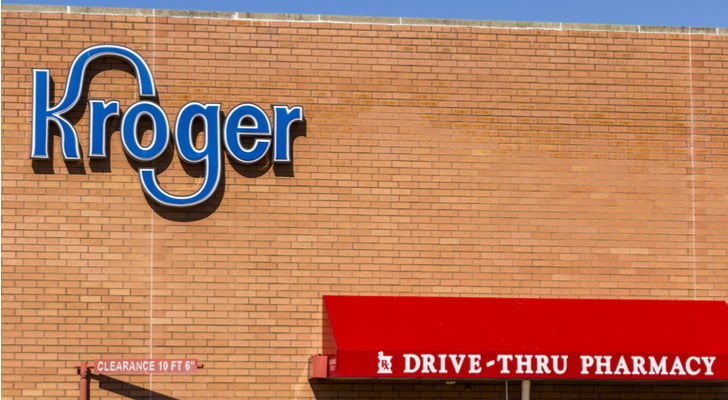Shares of Kroger (NYSE:KR) fell 10% in early trade Sept. 13 after it released earnings that beat estimates on the bottom line but came up short on the top. Fortunately for investors, most of the loss had been regained within one week.
Kroger said it earned $797 million, 62 cents per share fully diluted, on sales of $27.869 billion, and declared a 14 cent per share dividend. Analysts had been hoping for only 40 cents per share of earnings but decided the top line was light.
The fall may have been inevitable considering the rise in Kroger stock since March when it dropped to as low as $23 per share. KR peaked Sept. 7 at $32.37. Shares had fallen off in recent days and were a little over $31 when the results were announced. Joseph Hargett considered the stock a buy ahead of earnings.
So is Kroger sick or is it getting better?
Kroger Is Just Kroger
Despite a lot of hand-wringing, and some strategic changes, Kroger remains Kroger: a huge collection of disparate grocery and department store chains, each with their own target markets and management. Just how disjointed things are was revealed in June, when it was incorrectly reported that Kroger was abandoning the North Carolina market. In fact, it was turning over that market to its non-union Harris Teeter unit and closing 14 Kroger-branded stores that competed with it.
When Kroger announces strategic initiatives, in other words, expanding its digital team to 1,000 people, announcing an end to plastic bags, adding curbside pickup and home delivery, or launching a new apparel brand, it may relate to just one part of the company, not the whole. These innovations may filter down, but they must do so through subsidiaries that stand on their own and whose managements have a lot of autonomy.
This makes sense in that local Kroger management is on top of respective local trends and their own brand image. It makes no sense for a national brand to claim new products many shoppers won’t see. Cincinnati can talk all it wants about Restock Kroger, its delivery program … but does that deliver Fred Meyer? Does it deliver Roundy’s? Harris Teeter?
The Federated Example
Kroger, in short, is a lot like another Cincinnati-based company, Federated Department Stores. That chain of mall-based general merchandisers eventually bit the bullet and became Macy’s (NYSE:M
), bringing a host of local chains like Foley’s and Rich’s under a single identity. But after it brought the band together, in 2003, it was too late to fully address the problem with the department store format.
Kroger finally sold its convenience stores to a privately-held British group for $2.15 billion early this year, but it still runs a host of formats from Fred Meyer department and jewelry stores in Portland to high-end Mariano’s shops in Chicago. These territories often overlap, as Harris Teeter did with Kroger in North Carolina.
This tends to even out. One group may be overperforming, as the digital group is, while other groups underperform. The result is a wash, a company whose sales have grown just 12% since 2015, more like Walmart (NYSE:WMT) than Costco Wholesale (NASDAQ:COST).
The Bottom Line on Kroger Stock
Kroger remains the cheapest merchant you can buy, with a price-earnings ratio under 7 and a small dividend now yielding 1.7%. Those investors who bought shares in June 2015, when the company last announced a 2:1 stock split, are still down 32% on that investment, over three years later. Stock splits are supposed to represent management confidence that the new shares will soon get to the price of the pre-split shares. At Kroger, it just means they’re cheaper.
Dana Blankenhorn is a financial and technology journalist. He is the author of a new mystery thriller, The Reluctant Detective Finds Her Family, available now at the Amazon Kindle store. Write him at danablankenhorn@gmail.com or follow him on Twitter at @danablankenhorn. As of this writing, he owned no shares in companies mentioned in this article.

